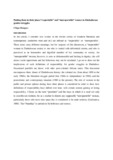Please use this identifier to cite or link to this item:
https://cris.library.msu.ac.zw//handle/11408/1263Full metadata record
| DC Field | Value | Language |
|---|---|---|
| dc.contributor.author | Hungwe, Chipo | - |
| dc.date.accessioned | 2016-05-08T13:15:24Z | - |
| dc.date.available | 2016-05-08T13:15:24Z | - |
| dc.date.issued | 2006 | - |
| dc.identifier.uri | http://agi.ac.za/sites/agi.ac.za/files/fa_6_feature_article_3.pdf | - |
| dc.description.abstract | Introduction In this article, I consider how women in the former colony of Southern Rhodesia and contemporary Zimbabwe were and still are defined as “respectable” or “unrespectable”. These terms carry different meanings, but for purposes of this discussion, a “respectable” woman in Zimbabwean society is one who is treated with deferential esteem, and who is perceived as an honourable and dignified member of her community or society. An “unrespectable” woman, however, is seen as dishonourable and lacking in dignity; she will attract social opprobrium and her behaviour may not be emulated. I go on to draw out the implications of such definitions of respectability for gender struggles in Zimbabwe. Occasional parallels are drawn with other post-colonial African states. This discussion encompasses three phases of Zimbabwean history: the colonial era (from about 1890 to the early 1960s); the liberation struggle period (late 1960s to independence in 1980); and the postcolonial and contemporary situation (1980 to the present). The role of women in the public and private spheres during these three phases is considered in order to show how definitions of respectability have shifted over time, with certain women gaining or losing respectability. I focus on the term “prostitute” and the ways in which it is used not only to describe sex workers, but as a marker to denote any supposedly “unrespectable” woman, particularly whose who move into space that is considered to be male territory (Gaidzanwa, 1995). This “branding” is carried out by both men and women. | en_US |
| dc.language.iso | en | en_US |
| dc.publisher | Feminist Africa | en_US |
| dc.relation.ispartofseries | Feminist Africa;Vol. 6; p. 33-47 | - |
| dc.subject | Women, Zimbabwean gender struggles | en_US |
| dc.title | Putting them in their place: “respectable” and “unrespectable” women in Zimbabwean gender struggles | en_US |
| dc.type | Article | en_US |
| item.openairecristype | http://purl.org/coar/resource_type/c_18cf | - |
| item.cerifentitytype | Publications | - |
| item.fulltext | With Fulltext | - |
| item.languageiso639-1 | en | - |
| item.grantfulltext | open | - |
| item.openairetype | Article | - |
| Appears in Collections: | Research Papers | |
Files in This Item:
| File | Description | Size | Format | |
|---|---|---|---|---|
| Putting them in their place.pdf | Introduction | 181.61 kB | Adobe PDF |  View/Open |
Page view(s)
180
checked on Jan 11, 2026
Download(s)
54
checked on Jan 11, 2026
Google ScholarTM
Check
Items in MSUIR are protected by copyright, with all rights reserved, unless otherwise indicated.



